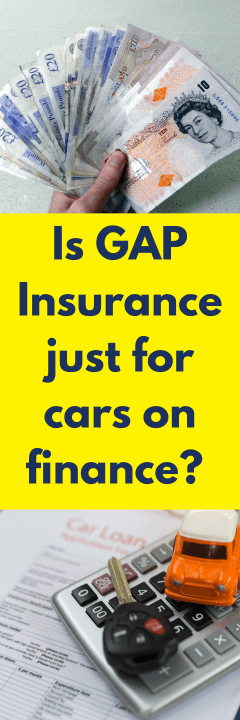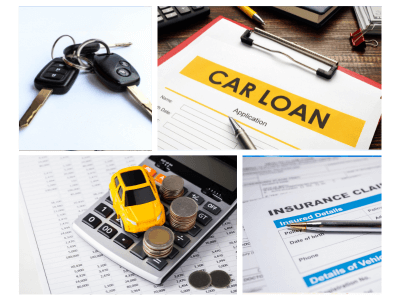Call Monday-Friday 9am - 6pm Closed Saturday & Sunday
Please select some policies.



Need Help? Calling from a mobile please call 0151 647 7556
0800 195 4926 / 0151 647 7556Do you have a question? or need help?
Call Monday-Friday 9am - 6pm Closed Saturday & Sunday,
At GAPInsurance123 we have been providing GAP Insurance products to UK vehicle owners for well over a decade. Over that period we have been asked, and have answered thousands of different questions around the subject of GAP Insurance cover.
Experience tells us that many people believe GAP Insurance is only for financed vehicles. 
However, we think this is a common misconception.
GAP Insurance can provide valuable protection for any vehicle, regardless of how it was purchased.
Here, we will look into the details of GAP Insurance and why it's a useful option even if you haven't financed your vehicle.
GAP Insurance, or Guaranteed Asset Protection insurance, is designed to cover an element of depreciation if the vehicle is written off following an accident, fire, theft, or flood.
The 'gap' that can be covered will depend upon which type of GAP Insurance you have in place. The common types, and what 'gap' they can cover are:
Vehicle Replacement GAP Insurance - to cover between the motor insurance payout and the cost of the equivalent replacement vehicle at the point of loss.
Return to Invoice GAP Insurance - to cover the difference between the motor insurance payout and the invoice price you originally paid.
Lease & Contract Hire GAP Insurance - to cover the difference between the motor insurance payout and the outstanding lease finance settlement
The idea of GAP Insurance policies is that they can top up the settlement provided by the standard car insurance provider's settlement.
So why do people think GAP Insurance should only be used for vehicles tied to a finance agreement?
The main concern of many is that they could be left with a shortfall to pay if the car insurance settlement is less than the amount owed on the finance agreement. In buying GAP Insurance cover, this shortfall can be covered without having to dip into your own savings.
This can particularly be the case on a lease, where you have no option to buy the vehicle but you still have the lease to pay for. The settlement from the motor insurance company may not be enough to pay off the lease, leaving you with a shortfall to pay. If you have a Lease and Contract Hire GAP Insurance policy in place then this shortfall can be covered.
If you have a vehicle financed via a hire purchase or personal contract purchase agreement, where you can own the vehicle, then a shortfall can also exist. However, if you are just worried about covering a shortfall then there are a few things to consider.
The types of GAP Insurance that cover just a financial shortfall on a hire purchase style agreement are called Finance GAP Insurance and Negative Equity GAP Insurance. These are both limited in their effectiveness and difficult to find.
If you have put a good-sized deposit into the car finance agreement, or you have carried equity from your part exchange vehicle onto the new agreement, then the chances of you having a shortfall to cover at all are diminished.
If you have got a good-sized deposit or equity carried over, then even if you had GAP Insurance just to clear a shortfall to the finance settlement then you would not get any of the equity or deposit back.
For the reasons detailed above, even when you buy GAP Insurance or vehicles financed on HP or PCP, in the majority of cases it is a form of Return to Invoice or Vehicle Replacement GAP that is offered. This means you can cover any financial shortfall but also protect equity built up in the vehicle or a deposit you put in.
Car purchased for £20,000
The amount financed is £19,000 over 48 months
Return to Invoice GAP purchased for 48 months
After a year the car is in an accident and written off as a total loss by the motor insurer. The motor insurer pays out the current market value at £15,000.
The outstanding finance settlement is now £16,000.
A claim on the Return to Invoice GAP Insurance covers the 'gap' between the motor insurers' settlement and the original invoice price paid for the car. Therefore the RTI GAP Insurance pays £5,000 in this example.
The total settlement of £20,000 allows the £16,000 finance settlement to be made. The policyholder has £4,000 left as a deposit for a replacement vehicle.
So is GAP Insurance worth it if you have paid for the car outright?
We would say so yes, and here is the reason why. 
Whilst the worry of having to pay off your finance and lease is not there when you own a car outright, you still have your investment in the vehicle. That is to say the purchase price of the vehicle that you have paid out of your own funds.
Some may say you do not need GAP Insurance if you have no finance to worry about. However, if the vehicle is written off or stolen then you still have to replace the vehicle. The motor insurance settlement of the current market value of the car may not be enough for you to replace the vehicle with one of your choosing.
A level of car GAP Insurance can help by topping up the motor insurers' settlement. This means you have extra funds to buy the standard of vehicle you want.
For example, if you originally bought a brand new car for cash then you could see a significant drop in value due to depreciation over the following few years. If the car was then written off then if you wanted a brand new replacement car from the car dealership then you may need to add to the motor insurer's settlement to be able to do so.
A simple GAP Insurance claim on a Return to Invoice or Vehicle Replacement basis could see a significant boost to the pot you have available to buy a replacement car.
Car purchased for £30,000
Paid cash from your own funds
Return to Invoice GAP purchased for 36 months
After two years the car is stolen and not recovered. The motor insurer decides to write off the car and pays out the current market value of £20,000.
A claim on the Return to Invoice GAP Insurance covers the 'gap' between the motor insurers' settlement and the original invoice price paid for the car. Therefore the RTI GAP Insurance pays £10,000 in this example.
The total settlement of £30,000 goes to the policyholder as there is no finance settlement to pay.
What about a situation where you buy GAP Insurance for a vehicle that you have financed in some way? Then, after a period of time, you settle off the agreement with the finance company and effectively own the vehicle outright.
Do you still need the GAP Insurance policy in place?
It depends on a number of factors.
Was the type of GAP Insurance you had just designed to cover a shortfall on a finance agreement, like Lease GAP Insurance or Finance GAP Insurance? If so, and you have settled your agreement with the car finance company, then there is no point in having GAP cover at that point. You could look to cancel the GAP policy and see if you can get a refund for the time left.
If you have paid off an HP, PCP or bank loan then there is still a clear benefit in protecting either the Invoice price you paid (by an RTI GAP Insurance policy) or the new car replacement cost (by a VRI GAP Insurance policy). The only difference is that without a finance loan settlement to pay then the entire payout is yours.
You do have the option of cancelling a GAP Insurance policy at any time if you feel you do not have the need for it anymore. However, you may be giving away a significant benefit and potential protection in doing so. It would be wise to chat with your GAP Insurance provider if you are thinking about cancelling, so you have all the facts to make the best decision for you.
A car is purchased, brand new, for £40,000
The vehicle is financed on a PCP agreement over 48 months. The amount borrowed is £30,000.
Vehicle Replacement GAP Insurance is purchased for 48 months
After two years the policyholder pays off the PCP agreement, meaning they now own the car outright.
After three years the car is set on fire by vandals. The car insurer decides to write off the car and pays out the market value of the car at £22,000.
The equivalent replacement new car is now £43,000.
A claim on the Vehicle Replacement GAP Insurance covers the 'gap' between the settlement from the car insurance policy and the cost of the equivalent new car. Therefore the VRI GAP Insurance pays £21,000 in this example.
The total settlement of £43,000 goes to the policyholder as there is no finance settlement to pay.
In most cases, yes. GAP Insurance can be purchased for new and used cars. There can be some restrictions with some GAP Insurance providers on some makes, models, values and uses.
.png)
Typically, GAP Insurance can be purchased at any time within the first six months to a year of owning a vehicle. However, policies vary, so it's important to check with individual GAP Insurance providers.
If your car is financed and it's written off or stolen, GAP Insurance can help pay off the remaining balance of your loan. This can be particularly beneficial if you owe more on your loan than the car is currently worth (i.e. you are in negative equity).
The length of GAP Insurance coverage can vary, but it's typically recommended for the first few years of car ownership. This is when cars tend to depreciate the most, increasing the potential 'gap' between what your car is worth and what you owe.
So GAP Insurance isn't just for financed vehicles. It's a valuable form of protection for any vehicle owner. By understanding what GAP Insurance is and how it works, you can decide whether you need it regardless of whether your car is financed or owned outright.
Published 04/7/23, written by Mark Griffiths